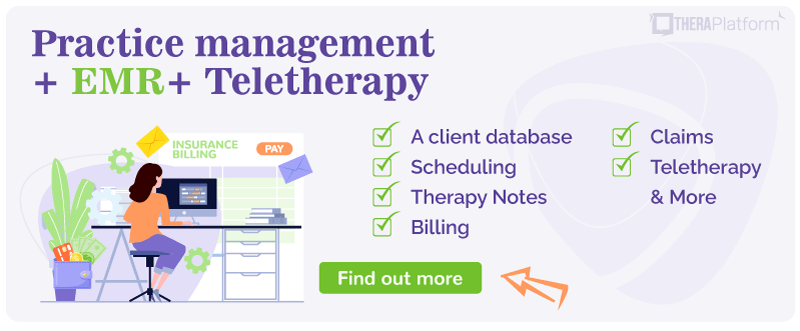Support for mental health professionals

Performing psychotherapy is a highly stressful job. Almost half of all therapists report feeling burned out. Clients go to therapy to take care of their concerns. But who takes care of the therapist? Therapists need support, just like any other person, to cope with their difficulties. This is especially true for therapists in private practice, who often work alone. It begs the question: Where does a private practice therapist go when they need help?
Supervision/consultation
Supervision and consultation are essential for a therapist in private practice. When you are still a trainee it is called supervision. When you become a licensed therapist, it may be termed consultation. Clinicians in a solo or group practice find themselves practicing alone much of the time and frequently require advice or support. Supervision can take a variety of forms.
Formal clinical supervision
Formal supervision is when a paid licensed therapist meets with you regularly and discusses your current cases and other professional troubles. Although a certification is not usually needed to be a clinical supervisor, training does exist. For example, PESI offers a comprehensive online course in clinical supervision for those who may want it. The supervisor is usually a seasoned therapist with sufficient expertise to provide the guidance you need. For trainees, supervision is required to attain licensure. For already licensed therapists, it is usually optional.

Peer groups
Peer consultation groups are a powerful form of supervision. They share the general advantages of group therapy while also receiving guidance and support from professionals working with similar clients. One advantage of a group private practice is that they have a built-in peer supervision group made up of members of the practice.
Informal peer consultation
Discussing a case informally with a peer is one of the most common forms of consultation. Whether it is discussing a case around the water cooler or bringing it up spontaneously with a colleague outside the office, informal supervision can be a valuable resource. However, because of its informal nature, therapists must keep confidentiality in mind when discussing clients outside a controlled environment.
Online communities
In the internet age, therapists have access to numerous online resources to gather advice and assistance.
Social media groups
Much like an in-person group, therapists can now join social media groups geared to provide therapist support. The sheer number of people online allows you to receive feedback and ideas from literally hundreds of therapists. You just need to make sure that the source of your information is credible. Many of these groups do not screen very thoroughly for group members’ backgrounds. Facebook, in particular, has several groups for therapists. You can find valuable information on a variety of topics, from the business side of private practice to learning new therapy techniques.
Subscription websites
Taking it a step further, you can now pay to join a site that specializes in providing resources for therapists. It is kind of like becoming a member of a small professional club. You have access to materials where they concentrate on therapist well-being. The Resourced Therapist is one such site, providing classes and meditations that focus on therapist self-care.
Professional organizations
Most therapists belong to a professional organization that relates to their particular background. For example, psychologists belong to the American Psychological Association and the National Association of Social Workers is the largest professional organization for social workers. These organizations provide numerous resources for therapists, including training, communication with other community members, and even legal assistance. They also present opportunities for therapist advocacy. The disadvantage of these groups is that they are huge and it can be difficult to carve out your niche within them.
Continuing education
Therapists are required to receive continuing education and many look upon it as an inconvenience. However, continuing education—depending on the topic—can impart information that can help you cope with difficult cases. This is especially true for in-person classes or webinars, where you can ask individual questions and receive direct feedback. Continuing education workshops are also places where you can network and make valuable connections that may offer both professional and personal help.
Professional support
Therapists are experts in therapy but a successful private practice requires knowledge of business, billing, administration, information technology, and potential legal issues. Regrettably, graduate school does not teach most of what a therapist needs to know to run a private practice. And—even if you did somehow know everything you needed to know—there are only so many minutes in a day. That is why you may want to employ a professional support team.
Delegating responsibilities to other professionals makes you more efficient and prevents you from feeling overburdened. For example, many clinicians in private practice outsource their billing to another person who possesses expertise in invoicing and insurance.
For those therapists who don’t want—or can’t afford—to hire others, practice management software such as Theraplatform offers therapists numerous resources to simplify their lives. It assists with scheduling, billing, and documentation in one easy-to-manage online platform.
Start 30-day Free Trial and explore TheraPlatform. HIPAA Compliant Video and Practice Management Software for Therapists.
Therapy
For personal support, psychotherapy is an option. Yes, even therapists sometimes need therapy. You can always find a therapist through word of mouth or on a therapy app, but this therapist online community provides pro bono therapy for members, which is more than worth the membership fee.
Self-care
Therapists are so often focused on other people that they forget that they need to take care of themselves. Self-care is a crucial—but frequently overlooked—aspect of being a therapist. Self-care looks slightly different to every person but getting enough sleep, eating healthily, and having fun are good places to start. Therapists must find a balance between work and the rest of their responsibilities to avoid burnout.
Private practice can be an isolated setting for therapists. It is crucial that they have the necessary support to deal with difficult clients and situations.
Resources
Theraplatform is an all-in-one EHR, practice management and teletherapy solution that allows you to focus more on patient care. With a 30-day free trial, you have the opportunity to experience Theraplatform for yourself with no credit card required. Cancel anytime. They also support different industries including mental and behavioral health therapists in group practices and solo practices.

More resources
- Therapy resources and worksheets
- Therapy private practice courses
- Ultimate teletherapy ebook
- The Ultimate Insurance Billing Guide for Therapists
- The Ultimate Guide to Starting a Private Therapy Practice
- Mental health credentialing
- Insurance billing 101
- Practice management tools
- Behavioral Health tools
Free video classes
- Free on-demand insurance billing for therapist course
- Free mini video lessons to enhance your private practice
- 9 Admin tasks to automate in your private practice
References
Brighter Vision. The ultimate guide to facebook groups for therapists. https://www.brightervision.com/blog/therapist-facebook-groups/
Karson, M. (2023, November 8). Psychology Today. Burnout Among Therapists in Trying Times. https://www.psychologytoday.com/us/blog/feeling-our-way/202311/burnout-among-therapists-in-trying-times



